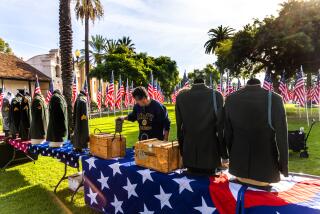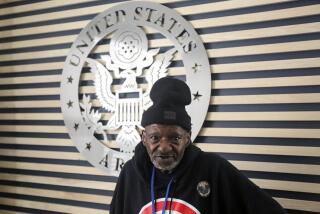Courageous Vietnam Veteran to Receive His Final Tribute
WASHINGTON — On Veterans’ Day, more than 20 years after an enemy mortar shell blew away most of his body below the waist, Freddie Paul Heugel rejoins his comrades who sacrificed their lives in Vietnam.
The name of Heugel, who died in 1984 of complications from his war wounds, has been inscribed on the Vietnam Veterans’ Memorial in Washington. It will be dedicated at a Nov. 11 ceremony with the names of 19 other servicemen recently added to the black granite wall, which carries the names of more than 58,000 Americans.
His mother, Maggie Heugel of Taylor, Mich., will be there.
“He would be very proud,” she said in a telephone interview from her home. A soft-spoken woman who works the night shift making salads for airline dinners, she still finds it hard to discuss her son without crying.
Truman A. Strong might not be able to attend the ceremony, but the event will be special nonetheless for the Livonia, Mich., dentist. Strong launched the campaign to have Heugel’s name inscribed on the memorial and enlisted the help of Rep. William Ford (D-Mich.), who interceded with the Pentagon.
“He was the nicest kid I’ve ever seen . . . very easygoing,” Strong said. “He deserves to be on that memorial as much as anybody.”
Heugel’s story begins in 1968 when he was 19 and working at a Dearborn Heights, Mich., service station when the draft notice came.
By Feb. 23, 1969--the day his life changed forever--he was Cpl. Heugel, assistant gunner on a 105 millimeter howitzer.
As he manned his weapon in a bunker two miles from the Ho Chi Minh Trail, a mortar shell exploded nearby, wounding a buddy. Heugel ran to summon a medic.
“Then I got it too,” Heugel said in a 1974 interview with the Detroit News. “I remember getting hit and smelling the gunpowder and then falling over backward. Then there was a medic leaning over me saying, ‘Oh, my God. Oh, my God.’ ”
He was evacuated to Japan, where doctors rated his survival chances as practically nil. Telegrams were sent to Michigan urging his family to hurry to his bedside.
One physician, however, suggested a risky operation that would involve further amputations and removal of 80% of Heugel’s spine. It would mean he would never even sit up again, but he might live.
Heugel resisted.
Ford’s office helped Heugel’s mother catch a flight to Tokyo, where she persuaded her son to undergo the surgery. He spent four years convalescing in hospitals, repeatedly confounding predictions that he would die within months.
With sheer grit and help from friends, he managed to lead a productive life despite being permanently confined to a prone position on a hospital gurney.
Heugel taught himself to drive a specially equipped van, controlling the brakes, gears and accelerator with a single lever. He and his mother drove to the 1982 World’s Fair in Knoxville, Tenn., and to Disney World in Orlando, Fla. A Veterans of Foreign Wars post raised money for an elevator and recreation room in Heugel’s home. He read, played pool and poker, and took up photography.
“We had a great time together,” his mother said. “Everybody that knew him loved him. He cheered up people who came to see him.”
He also became a volunteer in Ford’s congressional campaigns, driving workers around the district and making telephone calls.
“I have an annual family birthday picnic, and he’d come,” Ford said. “People would marvel at how he’d drive up in his van, wheel himself out on his gurney. . . . His courage was remarkable. I never heard a bitter word out of him, that he had gotten a raw deal, that anybody owed him anything.”
But life was difficult. Heugel required heavy doses of painkillers and he was constantly returning to the local veterans’ hospital for dialysis and other treatment. He developed cirrhosis of the liver from a blood transfusion, and toward the end his heart deteriorated.
No one disputed Heugel’s fitness for a spot on the Vietnam memorial when his name was submitted in 1987. But because of the strict qualification standards and red tape, it took a year to win the Pentagon’s approval.
For Maggie Heugel, the passage of time has made it no easier to understand the war and her son’s fate. “I don’t even watch the war movies on TV. I can’t,” she said. “I don’t know why it had to happen. Before my son went to Vietnam . . . he never said nothing like ‘I don’t want to go,’ but he just said, ‘Mom, why do we have to go and fight people we don’t even know?’ ”
Heugel died May 12, 1984, at age 35.
More to Read
Sign up for Essential California
The most important California stories and recommendations in your inbox every morning.
You may occasionally receive promotional content from the Los Angeles Times.










